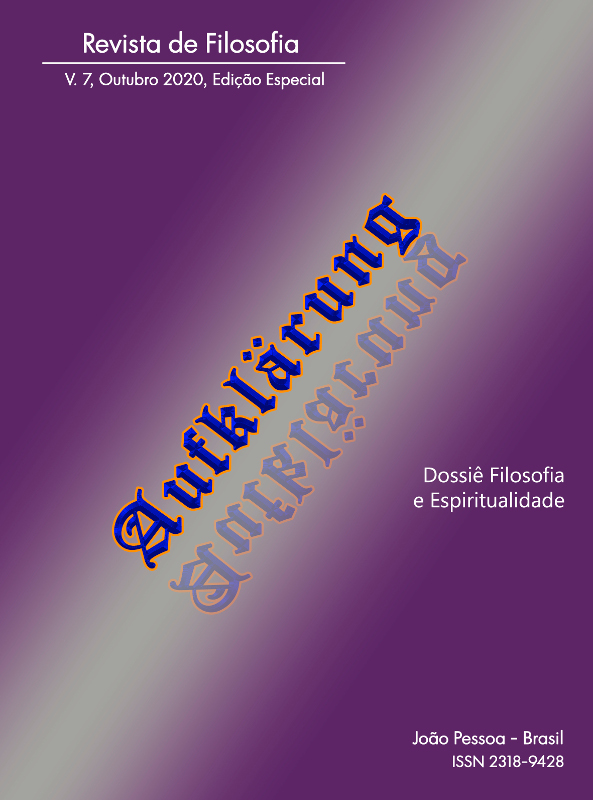Idealism and spirituality: Kant and the object of philosophy
DOI:
https://doi.org/10.18012/arf.v7iesp.56736Keywords:
Kant, ideality, objective knowledge, transcendent, transcendentalAbstract
In its most general sense, the concept of spirituality encompasses two basic components: on the one hand, the idea that beyond the material dimension of the world of experience, it is possible to have access to a world of transcendent meanings, in which we could find the real meaning of things and even the of the material world itself, on the other hand, the knowledge that the experience available in this form of access cannot be communicated. In his epistemological analysis of our access to the world, Kant establishes that all possible knowledge for human beings is limited to the world of objects given in experience under the conditions of the subjective faculties responsible for objective knowledge. Thus, we have not access to a world of transcendent objects, nor to the “real” meaning of things, that is, to the meaning of these things “in themselves”, but only to things as they may appear to us under the conditions of possible experience. On the other hand, the demonstration that the subjective faculties of our minds can guarantee the legitimacy of this objective knowledge is only possible through a (transcendental) proof establishing the intersubjective character of its fundamental representations (a priori and objectively valid) insofar as they constitute the necessary form of the unity of consciousness represented in the proposition “I think”. That is, insofar as the objective validity of these representations is demonstrated as necessarily shared by any consciousness that can represent itself in the proposition "I think". Thus, for Kant, the demonstration of the legitimacy of these concepts is irreversibly connected to the possibility of the intersubjective dimension of knowledge and, thus, of the communicability between the knowing subjects. This double requirement of the Kantian theory of objectivity sets Kant's epistemology in dissonance with the concept of spirituality defined in these general terms, and suggests that there is no room for a dimension of spirituality within the scope of his transcendental idealism. In this article, we examine how Kant’s transcendental project deals with such requirements of the concept of spirituality and of the transcendent.
Downloads
References
KANT, Immanuel. Crítica da Razão Pura, 5ª ed. Trad. Manuela P. dos Santos e Alexandre F. Morujão. Lisboa, Calouste Gulbenkian, 2001.
KANT, Immanuel. Sonhos de um Visionário Explicados pelos Sonhos da Metafísica. In: Escritos Pré-Críticos. São Paulo: Ed. Unesp, 2005. pp. 141-218.
ALLISON, Henry E. Kant’s Transcendental Idealism: An Interpretation and Defense (ed. revisada). New Haven, Yale University Press, 2004.
GUYER, Paul. The Cambridge Companion to Kant’s Critique of Pure Reason. Cambridge:_Cambridge University Press, 2010.
LACHIÈZE-REY, Pierre. L’idéalisme kantien. Paris: J. Vrin, 1950.
LEBRUN, Gérard. Sobre Kant. São Paulo, Iluminuras, 1993.
LONGUENESSE, Béatrice. Kant and the Capacity to Judge, trad. Charles T. Wolfe. Princeton, Princeton University Press, 1998.
ROUSSET, Bernard. La doctrine kantienne de l’objectivité, l’autonomie comme devoir et devenir. Paris: J. Vrin, 1967.
STRAWSON, P. F. The Bounds of Sense: An Essay on Kant's Critique of Pure Reason, Londres: Methuen, 1966.
VALENTIM, Antônio. “Sobre a Concepção Kantiana de Existência: a Filosofia Transcendental como Niilismo”. In: Studia Kantiana 9 (2009), pp. 201-226.
Additional Files
Published
How to Cite
Issue
Section
License
Journal general policy
1.This journal works under a Creative Commons License aplied to online journals. That icence can be read in the following link: Creative Commons Attribution 4.0 International (CC BY 4.0).
2.Accordingly to this License, a)the journal declares that authors hold the copyright of their articles without restrictions, and they can archieve them as post-print elsewhere. b)the journal allow the author(s) to retain publishing rights without restrictions.
Metadata Policy for information describing items in the repository
1. Anyone may access the metadata free of charge at anytime.
2.The metadata may be re-used in any medium without prior permission, even commercial purposes provided the OAI Identifier or a link to the original metadata record are given, under the terms of a CC BY license refered for the Journal.







































